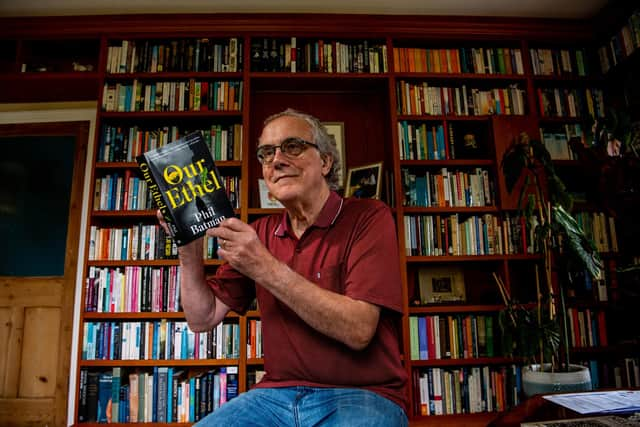Meet the Yorkshire forensic pathologist turned author who specialised in suspicious deaths of babies
So impactful still today is that childhood memory that Phil has used it as inspiration for his debut novel, a heart-wrenching tale of a young woman who is accused of the murder of her newborn baby, following his birth outside of wedlock.
Set in the 1950s and part courtroom drama, part social realism, Our Ethel is also inspired by Phil’s long career as a forensic pathologist, a path that stemmed from another incident of his youth.
Advertisement
Hide AdAdvertisement
Hide AdIt was race day in York, where Phil was raised by his paternal granny and aunt following the death of his mother when he was just a tot.


As he had done many times before, he headed to the racecourse and busied himself in a childhood fascination – collecting discarded betting strips from the day’s attendees – when a man who was stood next to him in the crowd collapsed and died suddenly. Phil was not yet ten when it happened.
“The normal reaction would have been horror but I thought blimey that’s interesting, I wonder what happened to him. And that was the start of wanting to be a pathologist.”
He pursued it steadfastly, spending six years in medical education at Cambridge University and then another six training to be a pathologist at St George’s Hospital in London.
Advertisement
Hide AdAdvertisement
Hide AdHe then worked in Bradford as a consultant pathologist before becoming a paediatric pathologist who specialised in suspicious deaths of babies.
He was called upon around the country to investigate such traumas as sudden infant death syndrome – also known as cot death – and shaken baby syndrome.
“When I first started in the 1980s, there was a lot of suspicion about parents whose babies had died of cot death,” Phil says.
“Parents were quite often arrested - they’ve just lost their baby and the neighbours would see the police car arrive outside their house and they were taken to the police station for questioning.
Advertisement
Hide AdAdvertisement
Hide Ad"It was horrendous. The finger of guilt was pointed at these people quite a lot. It’s handled a lot more sympathetically now.”
Phil’s role was to work out whether a death was due to natural causes or whether there was some pathology that couldn’t be explained by natural circumstances.
“A newborn baby has been through a traumatic time anyway,” he explains. “It’s been pushed and pulled getting into this world.
"It’s quite a traumatic event being born. If a short time later, sadly the baby dies, and is found to have injuries, they may be due to just being born.”
Advertisement
Hide AdAdvertisement
Hide AdPhil, who lives in Ilkley, worked in the profession for 40 years. It was a job he loved.
“It’s problem solving. It sounds gory but it’s not. It’s working out what’s happened. A paediatric death wasn’t a gory subject - it was a problem to be solved.
"It was a big thinking exercise working out what’s happened and whether the parents were guilty or innocent. It was very intricate and very involved, very absorbing really.”
Phil became an expert in the medico-legal defence of some parents charged with murder. He felt the agonising doubts between innocence and guilt and witnessed miscarriage of justice.
Advertisement
Hide AdAdvertisement
Hide AdOne particular case stands out – a mum “in a happy marriage with a wanted baby”, he says. The tot died at just a few days old. It was deemed to be murder and the mum was sentenced to prison.
“I carried out the defence post-mortem on this baby and came to the conclusion that she had not murdered her baby and I thought it was a terrible miscarriage of justice,” Phil reflects. “This case really got under my skin.”
He drew upon that experience in writing Our Ethel.
Exploring themes of co-sleeping and the way in which cot death has been approached by the medical and legal professions historically, the story is grounded by Phil’s expertise.
Timid Ethel Slater is at the tale’s centre. She grows up in a squalid terraced house in a railway community in 1950s York.
Advertisement
Hide AdAdvertisement
Hide AdPerpetually at the mercy of the men she encounters, she falls pregnant out of wedlock, retreats into obscurity and gives birth alone at home.
When her newborn is found dead in her bedroom a few days later and fatal head injuries are discovered at the post-mortem, Ethel breaks and confesses to the killing.
On trial for murder, she is plunged into a legal world she does not understand.
The voices of well-meaning neighbours who give evidence are twisted and distorted by their own secrets and fears and Ethel faces the death sentence for a brutal crime she may not have committed.
Advertisement
Hide AdAdvertisement
Hide Ad“Writing was hard,” Phil muses. “Writing scientific stuff is quite straightforward. It writes itself with the facts.
"Writing fiction is a blank page every day - it has to come out of your creative brain.
"Sometimes that is sluggish and uninspired and unmotivated. Other times it flows.”
He is now working on a sequel to the book, set in the same community, and again drawing on his pathologist background with another suspicious death.
Advertisement
Hide AdAdvertisement
Hide Ad“Writing for me is escapism,” he says. “If you’re writing, you’re not engaging with the real world where some fairly horrible things are going on. You’re in your own little world writing fiction.”
Our Ethel, by Phil Batman and published by The Book Guild Ltd, is out now.
